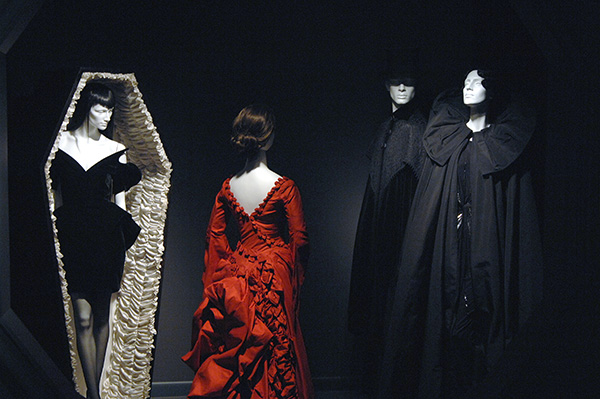Gothic: Dark Glamour
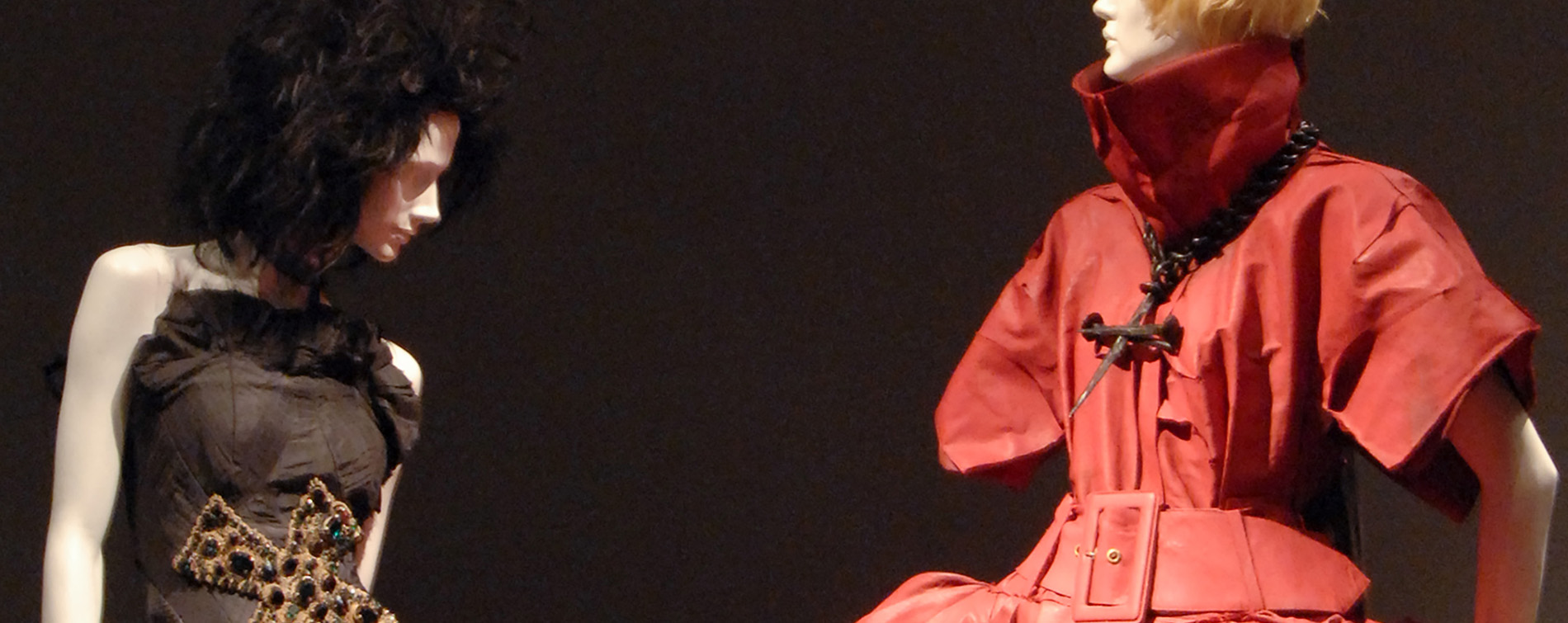 (Left) Alexander McQueen, evening dress, fall 2007, lent by Alexander McQueen (Right)
Christian Dior (John Galliano), evening dress and cross necklace, spring 2006, lent
by Christian Dior, Paris
(Left) Alexander McQueen, evening dress, fall 2007, lent by Alexander McQueen (Right)
Christian Dior (John Galliano), evening dress and cross necklace, spring 2006, lent
by Christian Dior, ParisGothic: Dark Glamour was the first exhibition devoted to the gothic style in fashion. Set in a dramatic mise-en-scene suggesting iconic gothic settings, such as the labyrinth, the ruined castle, and the laboratory, more than 75 ensembles were on display. Fashion designers featured included Alexander McQueen, Ann Demeulemeester, Boudicca, Comme des Garçons, Karl Lagerfeld for Chanel Haute Couture, John Galliano for Christian Dior, Jean Paul Gaultier, Hussein Chalayan, Francisco Costa for Calvin Klein, Christian Lacroix, Derek Lam, Gareth Pugh, Kei Kagami, Ricardo Tischi for Givenchy, Thierry Mugler, Rick Owens, Rodarte, Anna Sui, Olivier Theyskens, Jun Takahashi of Undercover, and Yohji Yamamoto.
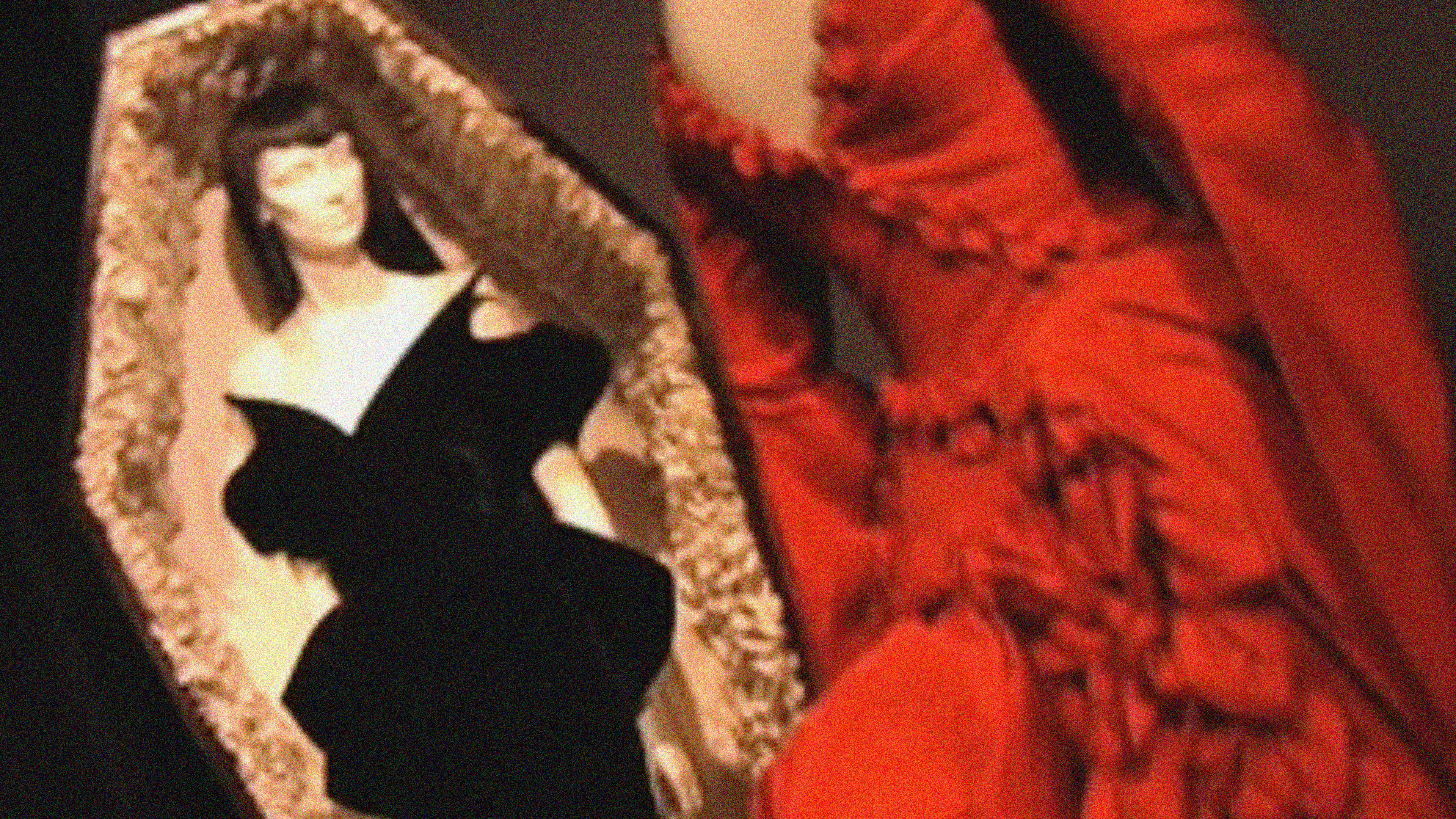
Also on display were a range of subcultural styles, such as "old-school goth" (associated with the heyday of the goth subculture, 1979-83), Victorian-style goth, industrial, steam punk, and cyber-goth, by designers such as Kambriel, Morphius and Plastik Wrap, as well as Japanese Elegant Gothic Lolitas by Tokyo-based brands Moi-Mme-Moit and h.Naoto Blood.
"Gothic" is an epithet that evokes images of death, destruction, and decay. Not simply a word that describes something, such as a Gothic cathedral, it is almost always a term of abuse that implies the dark, barbarous, and gloomy. Such negative connotations have made the gothic an ideal symbol of rebellion for a wide range of cultural outsiders. From its origins in 18th century gothic literature of terror to its contemporary manifestations in vampire literature and cinema, "the Gothic" has embraced the powers of horror and the erotic macabre. Throughout its history, fashion has been central to our vision of the gothic.
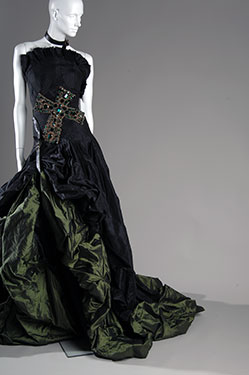
Alexander McQueen evening dress, black and green silk taffeta with glass jewel embroidery, fall/winter 2007, England, lent by Alexander McQueen. Photo by Irving Solero.
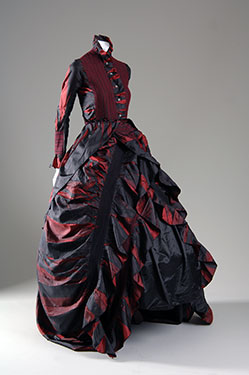
Yoshiki Hishinuma evening dress, black and burgundy polyester, fall 1996-1997, Japan, gift of Yoshiki Hishinuma, 2007.33.1. Photo by Irving Solero.
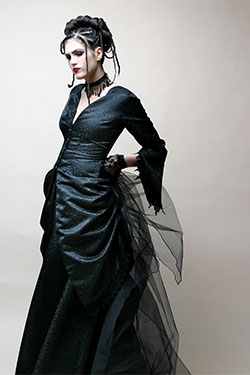
Kambriel, "Midnight Bustle" ensemble: jacket and skirt, satin finished black brocade, 2005, USA, lent by Kambriel. Photo by Nadya Lev.
"Although popularly identified with black-clad teenagers and rock musicians, the gothic has also been an important theme in contemporary fashion," said Dr. Valerie Steele, director of The Museum at FIT and curator of this exhibition. "The imagery of death and decay, the power of horror, and the erotic macabre are perversely attractive to many designers. For example, John Galliano told me that he saw the 'Gothic girl' as 'edgy and cool, vampy and mysterious,' while the most recent Rodarte collection was inspired by Japanese horror films."
An introductory gallery traced the development of gothic style from its origins in the eighteenth-century gothic literature of terror to its contemporary manifestations in art, fashion, and film. The Victorian cult of mourning, for example, was illustrated by actual mourning dresses, crepe veils, and momento mori jewelry. A Cabinet of Curiosities featured objects such as a wax head and the death mask of a poet. The vampire vignette included one of Eiko Ishioka's costumes for the film Bram Stokers Dracula. A selection of photographs was also on display.
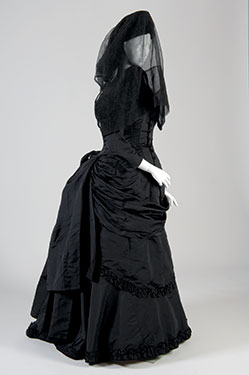
Victorian mourning dress, black silk and netting, c. 1880, lent by Evan Michelson. Photo by Irving Solero.
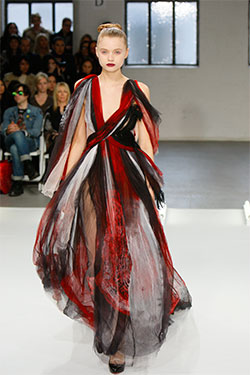
Rodarte dress, red and black silk chiffon, fall 2008-2009, USA, courtesy Rodarte. Photo by Dan Lecca.
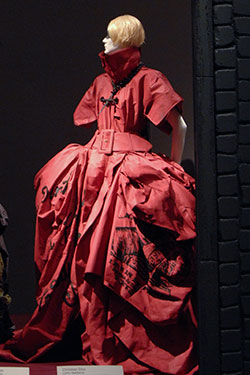
John Galliano for Christian Dior evening dress and cross necklace, red coated silk, black ink, and metal, spring 2006, France, lent by Christian Dior, Paris. Photo by Irving Solero.
Simon Costin, the British artist, jeweler, and set designer who has worked on many fashion shows, served as art director for Gothic: Dark Glamour. Costin worked closely with exhibition designer Charles B. Froom to create an appropriately gothic mise-en-scene. The main gallery space was designed as a labyrinth, divided into iconic spaces such as Night, with seductive black evening dresses; the Ruined Castle, which conveys a sense of the Dark Ages; and the Laboratory, with futuristic fashion "monsters." Towering in the background was the Haunted Palace, which evokes Edgar Allan Poe's architectural metaphor for a disturbed mind.
Google Arts & Culture
Gothic: Dark Glamour was featured in Google's Arts and Culture, "We Wear Culture" project, a collaboration with The Museum at FIT and over 180 renowned cultural institutions from New York, Longond, Paris, Tokyo, São Paulo, and around the world. View the exhibit below and through the Google Arts & Culture app on iOS and Android devices.
the first exhibition devoted to the gothic style in fashion
"The imagery of death and decay, the power of horror, and the erotic macabre are perversely attractive to many designers." - Dr. Valerie Steele
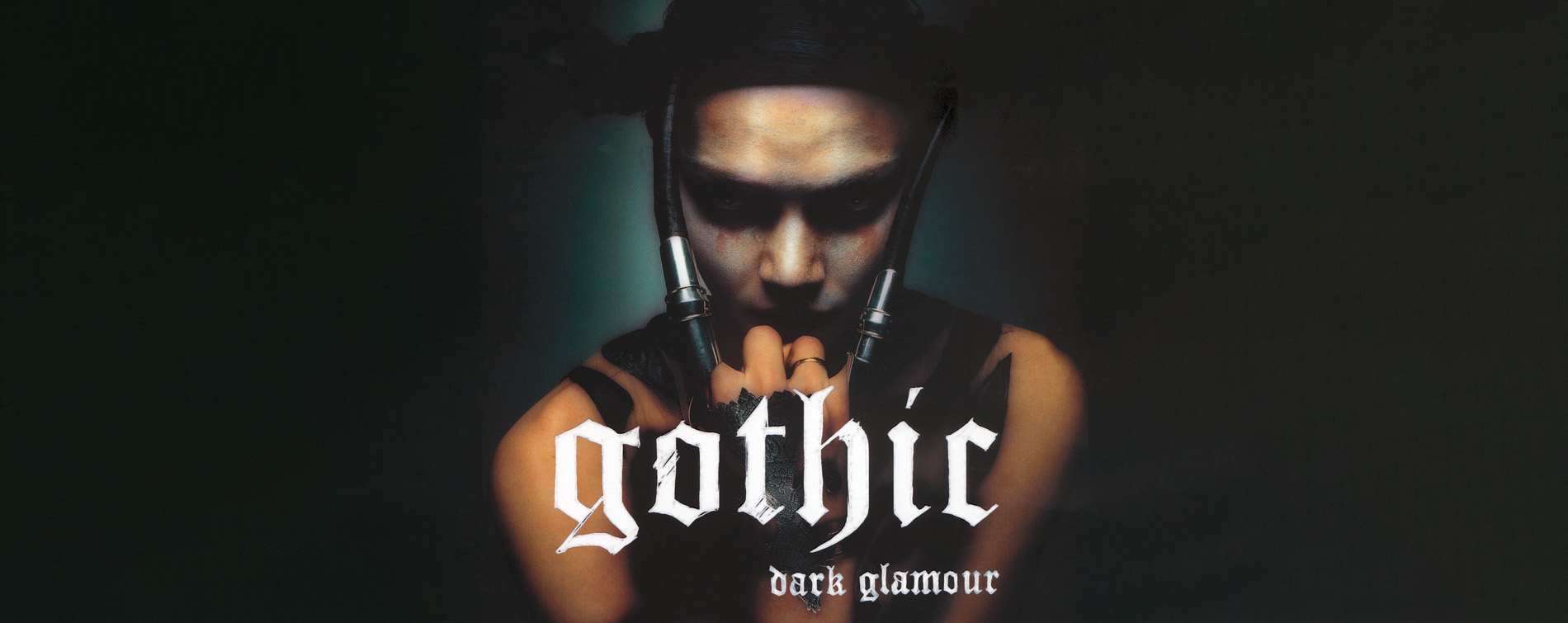
Exhibition Publication
Proceeds from the book, published by Yale University Press, go to the Fashion Institute of Technology.
In the Press
Subculture and Style Fashion Symposium
Valerie Steele and Jennifer Park: Book Signing
Contemporary Gothic: Poetry and Prose
Dive Deeper Into Dark Glamour
Reading List
Listen to Discography
Image, left to right: Thierry Mugler, dress, black silk velvet, fall 1981, France, museum purchase; Eiko Ishioka, costume for the film Bram Stoker’s Dracula (1992), red silk, 1992, USA, lent by Francis Ford Coppola, American Zoetrope; Arkivestry, bespoke cape, 1994, USA, lent by Morpheus Blak; Valentino Couture, evening dress and opera coat, fall 1983, Italy, coat: spring 1985, Italy, lent by Valentino Couture.
Gothic: Dark Glamour was supported in part by The Coby Foundation, Ltd. Additional support was provided by the Couture Council.
